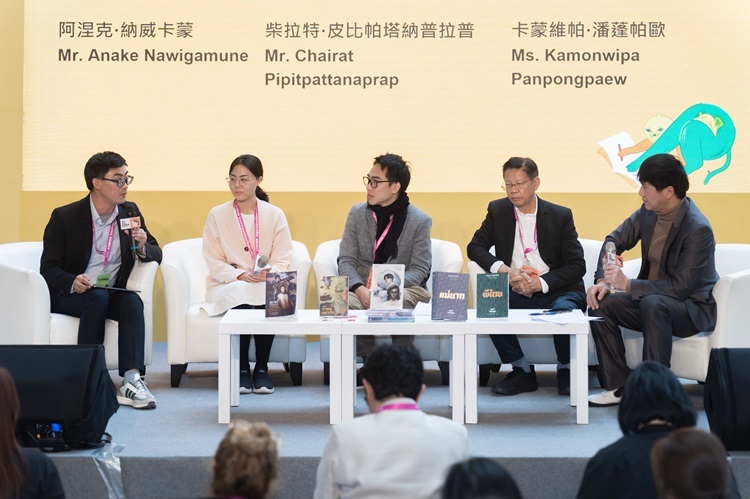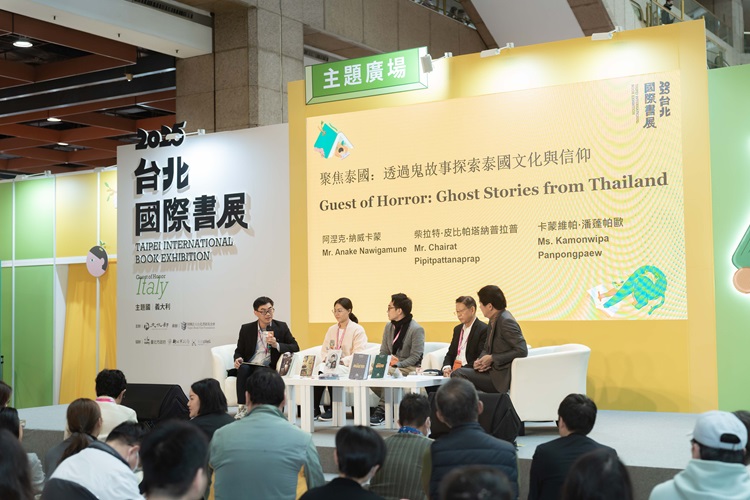Guest of Horror: Ghost Stories from Thailand—Exploring Thai Culture and Beliefs Through the Supernatural

At the 2025 Taipei International Book Exhibition (TIBE), the Theme Square hosted a captivating panel discussion, Guest of Horror: Ghost Stories from Thailand, featuring three esteemed Thai authors: Anake Nawigamune, a literary artist and nonfiction researcher; Chairat Pipitpattanaprap, a renowned mystery and detective novelist; and Kamonwipa Panpongpaew, a rising star in the BL (Boys’ Love) genre. Through Thailand’s internationally recognized ghost stories, they introduced the audience to the country’s rich cultural traditions and supernatural folklore.
The Many Faces of Thai Ghosts
The discussion brought forth a variety of notorious Thai spirits, including Krasue, the floating ghostly head with glowing entrails; Nang Nak, the devoted ghostly wife who haunts the living out of love; and Pret, the towering, restless spirit cursed with an insatiable hunger. Each of these supernatural entities has deep cultural significance, offering the audience a glimpse into Thai beliefs about the afterlife and the unseen world.
The panelists, each specializing in different literary genres, all incorporate ghostly elements into their works, leading to an engaging exchange of perspectives on Thai horror literature. When asked why they chose to write ghost stories, Anake Nawigamune explained that as a nonfiction researcher, he was drawn to the subject because Thailand’s academic studies on ghost stories remain incomplete, inspiring him to explore this uncharted area.
Chairat Pipitpattanaprap, on the other hand, confessed that despite being terrified of ghosts—so much so that he gets nervous staying in hotels and imagines paranormal events—his fear fuels his creativity. His horror stories, he admitted, are often a product of his own haunted imagination. Meanwhile, Kamonwipa Panpongpaew described ghosts as a deeply intriguing subject with a personal connection. She shared a childhood experience of seeing a ghost at the age of five: one day, someone knocked on the door asking for her father, but when she opened it, the person had vanished. Later, she realized that her father had been attending a friend’s funeral that day, and the mysterious visitor might have been the spirit of the deceased.
The Evolution of Thai Horror Literature
When discussing the characteristics of Thai ghost stories, Kamonwipa Panpongpaew introduced her work, Don't Be a Jerk at 3, Ghost's Damn Real!, a horror-comedy about hungry ghosts, emphasizing that Thai horror can also be humorous and entertaining. Anake Nawigamune, who has extensively studied the legend of Nang Nak, the famous ghost wife, noted that Thai people are inherently creative and humorous. As modern sensibilities evolve, so do writing styles. Contemporary Thai literature increasingly adopts casual language, slang, and even profanity—elements once considered inappropriate but now widely accepted by younger audiences.
Chairat Pipitpattanaprap presented his latest novel, Monkey & Tiger (tentative English title), a suspenseful story set during the Japanese invasion of Thailand in the 1940s. He highlighted how parts of the book are written in rhyming poetry, which not only adds literary depth but also serves as a crucial narrative clue. He further explained that ghost stories can be more than just horror; they can also serve as a medium for social commentary, using supernatural elements to critique modern Thai society.
A Personal Connection Between Thailand and Taiwan
The lively discussion sparked enthusiastic engagement from the audience, including Thai attendees. In an unexpected twist, a question from the audience led to the revelation of Chairat Pipitpattanaprap’s personal connection to Taiwan—his grandfather’s twin brother had immigrated to Taichung. Surprised by the discovery, Chairat Pipitpattanaprap expressed regret that he had only learned of this connection after completing his novel, missing the opportunity to incorporate it into his writing.
Meanwhile, Kamonwipa Panpongpaew, on her first trip abroad, was thrilled to visit Taiwan, while Anake Nawigamune, on his first visit, expressed his admiration for Taiwan’s museums. The discussion not only provided an immersive experience into the world of Thai ghost stories but also fostered a meaningful cultural exchange, making the event both insightful and unforgettable for the audience.
